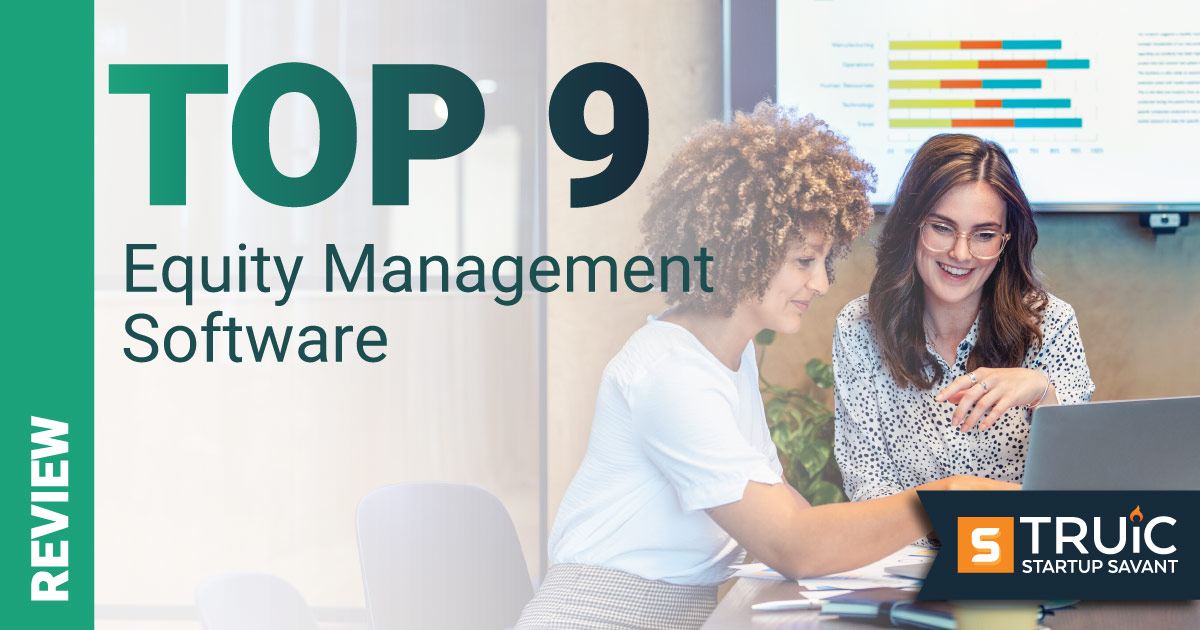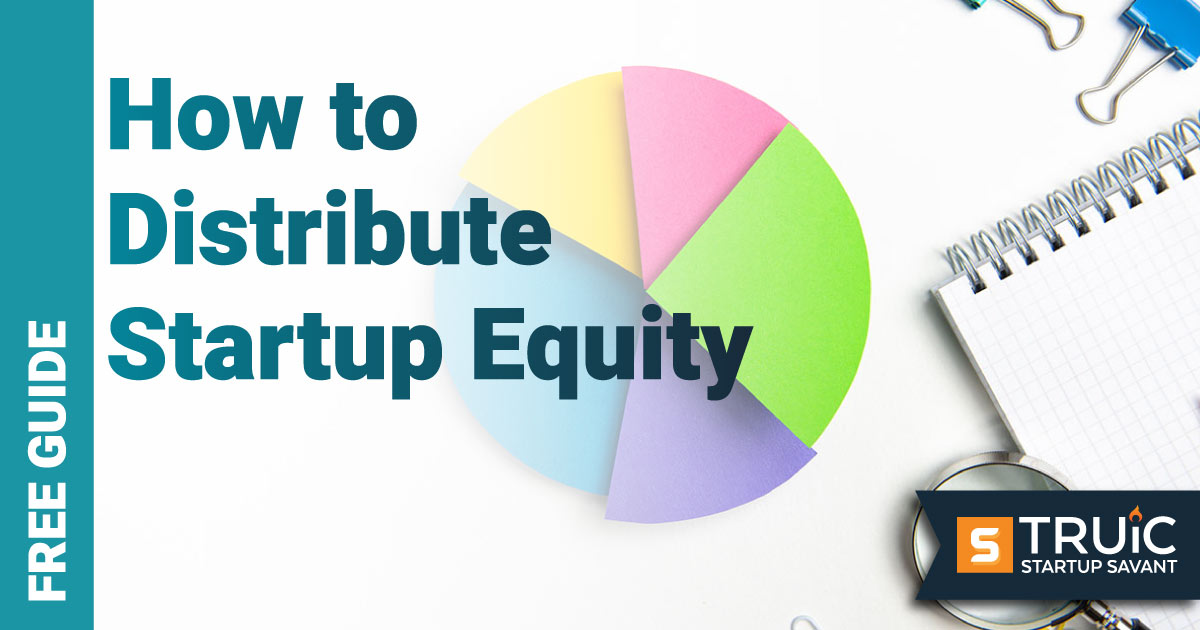9 Best Equity Management Software for Startups in 2024

Last Updated: By Reyna Hurand
Managing startup equity can get complicated fast, especially as you take on investors and employees. Thankfully, investing in a reliable equity management solution can save you headaches by organizing cap tables, tracking ownership, and keeping records up-to-date.
In this review, we compare the best equity management software for startups in 2024. We explore pricing, features, ease of use, and more to help you choose the right platform for your business.
Recommended: Streamline equity management effortlessly with Carta—request a demo today.
Top Startup Equity Management Tools
Equity management refers to the process of tracking and administering shares or ownership stakes in a company. This can involve monitoring stock options, understanding cap tables, handling stock issuances, and ensuring legal compliance.
Equity management software aims to make all of this easier by automating the messy behind-the-scenes work. This allows you to focus on the big picture of growing your business instead of handling spreadsheets and paper trails.
To get you started, we’ve shared some of the leading equity management platforms the market has to offer. Just remember, every startup is unique, so think about what your venture needs as you weigh these options.
Best Equity Management Tools for Startups:
Best Equity Management Software: Carta
Carta's all-in-one equity management platform helps you manage stakeholder interests seamlessly. Sign up for a demo today!
1. Carta
Carta is an end-to-end equity management platform designed for startups of all stages. With Carta, founders can manage employee equity, valuations, investments, and equity ownership all in one place. The seamless workflows make Carta a great choice for lean startups looking to scale efficiently.
Pricing
When it comes to pricing, Carta has designed its packages to cater to various stages of a startup's growth journey. They understand that an early-stage startup might not have the same needs (or budget) as a large enterprise, so they offer flexibility in their pricing plans.
The cost essentially depends on the number of stakeholders, how complex your capitalization table is, and which plan you choose.
- Launch: Best for early-stage founders; free for startups with up to 25 stakeholders and up to $1 million raised.
- Build: Ideal for growing startups; custom pricing available upon request.
- Grow: Tailored for more established startups; custom pricing available upon request.
- Scale: Designed for large ventures needing advanced tools; custom pricing is available upon request.
Notable Features
In terms of features, Carta really aims to automate the tedious equity tasks that can drain founders' time. Key highlights include:
- Automated Cap Table Management: Cap tables update in real-time as securities are issued, and transactions occur to eliminate errors and manual work.
- Audit-Ready 409A Valuations: Leverages proprietary software and internal experts to deliver fast, accurate, and compliant 409A valuations tailored to your business.
- Data Rooms: Provides a secure space to store and share key documents with investors and lawyers during due diligence.
- End-to-End Equity Plans: Create, manage, and track detailed equity compensation plans like option pools and RSU grants.
- Compliance Features: Tools to handle compliance needs like 83(b) elections and Rule 701 disclosures.
Pros
- Reputation & Reliability: Trusted by over 35,000 companies.
- Dedicated Support: Phone, email, and in-app support from equity and tax experts.
- Free Option for Early-Stage Startups: Carta Launch provides cap table management, ownership tracking, and SAFE issuances at no cost.
- Seamless Scaling: The platform scales up seamlessly from issuing your first SAFE to running a tender offer and going public.
Cons
- Complexity: With a wide range of features, the platform might seem overwhelming to some users, especially those new to equity management.
- Non-transparent pricing: Carta's pricing is not straightforward and publicly listed. You need to inquire with sales for pricing details of various plans.
With its comprehensive suite of features tailored to a range of business needs, it's clear why so many startups trust Carta to handle their equity management. The powerful modeling and valuation tools provide unmatched insights to help startups plan for the future.
Recommended: Streamline equity management effortlessly with Carta — request a demo today.
2. Pulley
If Carta’s enterprise-level features seem excessive for your early-stage needs, Pulley is a great alternative to consider. Pulley is an all-in-one platform designed to help startups manage their equity compensation and ownership. It provides tools to create and maintain a cap table, model different financing scenarios, issue stock options/RSUs, obtain 409A valuations, and generate shareholder certificates.
Pricing
Pulley provides comprehensive pricing options to cater to various stages and needs of startups:
- Seed: Free for startups with fewer than 25 stakeholders and having raised less than $1 million.
- Startup: $1,200/year for 25 stakeholders.
- Growth: $3,500/year for 40 stakeholders.
- Custom: Contact for tailored solutions.
Notable Features
Some of Pulley's key features that help simplify equity management for founders include:
- Simplified Fundraising: Manage the entire fundraising process, from modeling your round to issuing SAFEs.
- Quick 409A Valuations: Obtain a 409A valuation in less than five days, ensuring that you’re always compliant and ready for audits.
- Automated Equity Compliance: The platform automates processes like 83b elections, form 3921, and stock-based comp reports, making equity compliance less of a headache.
- Enhanced Stakeholder Experience: Pulley tailors tools for employees (clear vesting insight), investors (simple updates), and HR/Legal (efficient, error-free workflows).
Pros
- Versatility: Suits various ownership structures like crypto, tokens, private equity, and LLCs.
- Free for Small Companies: Available for free for firms with up to 25 stakeholders.
- Integration with payroll/HRIS: Pulley can integrate with payroll and HR systems to sync employee data.
Cons
- Limited Advanced Features: As a company grows and its equity management needs become more complex, the platform may lack some of the advanced features found in other software.
Overall, Pulley is best suited for bootstrapped startups who want an affordable, cloud-based solution to equity management. With easy-to-understand financial modeling and compliance features, Pulley takes care of the nitty-gritty details so founders can focus on growing their business.
3. Shareworks
Next up on our list is Shareworks, an equity compensation management platform tailor-made for the distinct needs of both public and private firms. Shareworks is designed for cross-departmental collaboration with controlled access levels and data privacy features. This enables startups to securely share equity information across teams as they scale. With Shareworks, equity compensation data can be leveraged to motivate employees and create an ownership culture.
Pricing
Shareworks does not publicly disclose pricing information on its website. Interested customers must contact the Shareworks sales team directly to obtain custom quotes based on their unique needs.
Notable Features
Some of the key capabilities and features that Shareworks offers include:
- 409A Valuation Services: Provides valuations that are prepared and ready for potential audits, saving businesses from last-minute hustles.
- Financial Advisor Support: Entrepreneurs and employees can consult with expert financial advisors to make more informed decisions.
- Streamlined Liquidity Management: Advanced tech streamlines the transaction workflow, making the management of liquidity events and secondary transactions more efficient.
Pros
- All-in-One Access: Provides real-time reporting and a centralized source for all your plan information.
- Adaptability for Growth: Suitable for various stages of a company's lifecycle, from startups to those prepping for IPO.
Cons
- Learning Curve: Shareworks is feature-rich, which also means it can have a steep learning curve to understand and use all of its capabilities effectively.
- Lack of Pricing Transparency: Interested customers need to contact the sales team for a customized quote based on their plan size.
All things considered, the combination of automated equity administration, robust reporting, and collaboration features makes Shareworks an excellent choice for entrepreneurs looking to effectively manage equity compensation.
4. Gust
Gust provides free cap table management software designed specifically for early-stage startups raising initial funding. For founders navigating the complexities of ownership, Gust makes it straightforward to issue stock options, secure a 409A valuation, simulate funding rounds, and understand cap table ownership—no legal jargon or messy Excel sheets required.
Pricing
Gust provides basic cap table management software for free.
The Cap Table Plus package includes live chat support and has a subscription fee based on capital raised and revenue.
For 409A valuation services and audit support, which help establish fair market value and ensure IRC § 409A compliance, Gust partners with Preferred Return. Contact them at gust@preferredreturn.com for pricing.
Notable Features
Here's a glimpse into Gust Equity Management’s core offerings:
- Cap Table Management Software: Provides free tools to manage company ownership, including issuing options, cap table tracking, and more.
- Receive Audit-Defensible 409A Valuations: Startups can obtain 409A valuations from Gust's in-house analysts, which are robust and can stand up to scrutiny during audits.
- Model Fundraising Rounds & Exits: Enables startups to simulate various scenarios like fundraising rounds or company exits, helping them strategize and make informed decisions.
Pros
- Intuitive interface: Designed for easy cap table sharing with stakeholders and modeling different scenarios like funding rounds.
- Compliance features: The software helps startups stay on top of compliance requirements related to equity management.
- Trusted by Many: Serving over 2,000 customers and having delivered over 4,000 valuations provides Gust with a track record of reliability.
Cons
- Limited Reporting: While Gust provides standard cap table reports, it lacks more advanced analytics and visualizations found in some competitor platforms.
- Limited Customization: As packaged software, Gust may not be as customizable as building something in-house.
Overall, for venture-backed startups that are setting their sights on seed or Series A rounds, Gust provides a comprehensive solution to navigate equity management during those pivotal early phases.
5. LTSE Equity
LTSE Equity provides a dynamic platform for startups, aiming to craft a compelling narrative of their journey while efficiently managing their equity. Built by founders for founders, this platform aligns with every stage of a startup's life, ensuring that its equity story not only resonates with its vision but also captures the attention of potential investors.
Pricing
LTSE Equity offers transparent and affordable pricing tailored to each startup stage:
- Basic: Free for up to 10 stakeholders and $1 million raised
- Fundamentals: $60/month for 11–100+ stakeholders
- Boost: $330/month for priced rounds and external boards
Notable Features
LTSE Equity provides startups with core equity administration capabilities and advanced tools like:
- Stock Option Tools: Flexible stock issuance with various vesting schedules.
- Financing & Exit Models: Gives startups a crystal-clear view of their financial future, aiding in visualization for fundraising scenarios and providing exit strategy simulations.
- Audit & Reporting: Provides a detailed tracking system, showcasing who made changes and when, and facilitates compliance with regulations like Rule 701.
Pros
- Transparent Pricing: With clear pricing tiers and functionalities, startups can budget effectively without unexpected expenses.
- Collaborative Features: Built-in sharing and collaboration tools ensure that all relevant stakeholders, whether internal or external, remain in the loop.
- Founder-Centric Approach: Designed by founders for founders, ensuring intuitive and relevant tools tailored to startup needs.
Cons
- Setup Assistance Needed: For those unfamiliar with equity management, the initial setup can be daunting without guidance.
All things considered, LTSE Equity offers a holistic approach to equity management, ensuring startups are not just managing numbers but crafting their story in the process.
6. Ledgy
Ledgy is an excellent equity management solution for early-stage startups looking to automate and streamline their equity workflows. With an intuitive dashboard, Ledgy makes it easy for companies to manage employee onboarding and offboarding, create cap tables, facilitate financial reporting, and remain compliant across jurisdictions.
Pricing
Ledgy offers flexible pricing plans to meet the needs of startups at any stage:
- Launch: Free, up to 25 stakeholders.
- Growth: €3 ($3.26)/stakeholder/month for up to 50 stakeholders.
- Scale: Custom pricing is available upon request. Unlimited stakeholders, powerful HR integrations, etc.
- Enterprise: Custom pricing is available upon request. Unlimited stakeholders, enhanced security features, etc.
Notable Features
Some of Ledgy’s key capabilities and tools include:
- Cap Table Management: Keep your cap table in check with features for versioning and potential scenario projections.
- Compliance Readiness: Ensure you remain compliant globally with detailed audit trails and reporting.
- Workflow Automation: Automate everything from onboarding to offboarding, exercising, and esigning.
- Financial Reporting: Generate investor-ready 409A valuations and financial reports with one click.
Pros
- Intuitive Dashboards: Interactive dashboards make equity easy to understand for employees, founders, and investors.
- Security: Enterprise-grade security protects your sensitive data, including SOC 2 compliance.
- Scalability: Ledgy grows with you from launch to IPO with pricing for any stage.
Cons
- Limited Hand-Holding on Basic Plans: If you're not on the Enterprise package, you'll be navigating the onboarding process with a bit more of a self-starter approach.
With easy-to-use software focused on usability, customizability, and stellar customer support, Ledgy is an ideal solution. Startups can manage equity their own way while trusting Ledgy to keep sensitive data secure and compliant.
7. Eqvista
Eqvista is an equity management and 409A valuation platform designed for startups and growth-stage companies. With easy-to-use cap table management, robust reporting, and integrated valuations, Eqvista streamlines equity processes so you can focus on growing your business. The software is ideal for startups raising investments or issuing employee stock options.
Pricing
Eqvista offers three flexible pricing plans suitable for companies at different stages:
- Freemium: Free for up to 20 shareholders.
- Premium: $2/shareholder/month. Unlimited shareholders.
- Enterprise: Starts at $125/month. Pricing tiers are based on number of shareholders.
Notable Features
Eqvista provides robust cap table management and equity administration tools, including:
- Cap table management: Issue common and preferred shares, stock options, and RSUs. You can also track vesting schedules, exercise prices, and expiration dates.
- Shareholder management: You can onboard investors, employees, and legal counsel as well as ive shareholders portal access.
- 409A valuations: Safe harbor-compliant valuations done by credentialed analysts.
Pros
- Intuitive Interface: User-friendly design, making navigation and operations smooth.
- Scalable Solution: Flexibly adapts to startups at different growth stages.
- Comprehensive Reporting: Provides detailed insights, aiding in informed decision-making.
Cons
- Limited Integrations: May not seamlessly connect with all third-party tools or software.
Eqvista provides full-featured equity management and valuations in one easy-to-use platform. Their combination of robust features and integrated 409A valuations makes Eqvista a great choice for startups ready to level up.
8. Global Shares
Trusted by major global enterprises, Global Shares aims to simplify employee share ownership through user-friendly tools for cap table management, stock plan administration, and stakeholder engagement. The platform offers both self-service and fully managed solutions tailored to each company's needs.
Pricing
For early-stage startups, Global Shares offers a self-service Growth Platform with free access for under 100 stakeholders. Upgrading to Premium adds more features and unlimited stakeholders from $3/stakeholder/month.
For larger enterprises, the platform provides fully managed Enterprise Solutions with customized pricing to outsource equity compensation management.
Notable Features
Global Shares provides a robust set of equity management tools:
- Online Portal: A specialized dashboard for employees, shareholders, and investors, streamlining the view and management of their equity rewards.
- Scenario Modeling & Waterfall Analysis: Analyze potential investment scenarios and visualize future exit strategies.
- Communications: A suite of tools backed by years of expertise to enhance employee engagement and understanding regarding their stock plans.
Pros
- Reputable Client Base: Trusted by global companies like Cargill, Generali, GSK, and L'Oréal, which attests to its quality and reliability.
- Versatile Platforms: Offers distinct platforms like the Growth Platform for early-stage companies and Enterprise Solutions for larger, more complex entities.
- Global Reach: Engages workers in over 100 countries and deals with over 60 currencies, making it suitable for businesses with an international presence.
Cons
- Might be Overkill for Very Small Ventures: Businesses just getting started might find the platform more than they need, particularly if they're not yet thinking globally.
Overall, with its global expertise and focus on equity compensation, Global Shares is trusted by enterprises worldwide to simplify employee share ownership. Whether you need a self-service plan or full-service outsourcing, it may be a great equity management solution for you.
9. Certent
Certent Equity Management makes handling admin tasks a breeze while also strengthening compliance and reducing the risks linked to equity compensation plans. With its real-time data and no need for IT expertise, Certent is trusted by both public and private enterprises looking to boost their financial operations.
Pricing
Certent does not publicly disclose pricing information on its website. Interested clients must contact the Certent team directly to obtain custom quotes based on their unique needs.
Notable Features
With a foundation built on efficiency and transparency, Certent offers the following core features:
- Streamlined Equity Administration: Through its participant/shareholder portal, administrative roles, and over 400 pre-built reports, Certent eradicates manual processes and enhances organization-wide productivity.
- Compliance and Reporting: Tailored to meet SEC, FASB, and IFRS standards, the platform simplifies ASC 718 compliance and auto-generates essential tax reports.
- Advanced Cap Table Management: Organize and analyze stakeholder data with date-specific cap tables, distribution waterfalls, and robust award support.
- Simplified ESPP Tasks: Manage and design flexible Employee Stock Purchase Plans (ESPP) efficiently, promoting increased employee interaction.
Pros
- Audit and Modification: Features like full audit trails, grant modifications, and data imports enhance transparency and adaptability.
- User-Friendly: Designed for ease of use without requiring specialized IT skills.
Cons
- Initial Learning Required: With its wide range of features, some users might require time to fully harness the platform's potential.
All in all, Certent is designed to scale with organizations from startup to IPO. The platform provides an intuitive way to manage cap tables, stock plans, modeling, reporting, and more — all from one centralized hub.
FAQs
What is equity?
Equity refers to the ownership interest in a company, typically represented by equity awards like stock options or restricted stock units (RSUs). These awards are part of compensation packages and grant holders a stake in the company, aligning their interests with those of shareholders.
What is a cap table?
A cap table, or capitalization table, is a document detailing a company's equity structure, including share ownership and equity dilution. Cap table management software helps manage these details, particularly for startups and venture capital-involved companies, by tracking equity grants and understanding shareholder impacts.
What is an equity management platform?
An equity management platform is software designed to help companies manage employee stock plans, cap tables, and other equity programs. These platforms provide tools to administer grants, model scenarios, create reports, and more. They consolidate equity tasks into one centralized solution.
Why use equity management software?
Equity management software offers a streamlined approach, eliminating time spent on intricate spreadsheets and minimizing errors. Moreover, it ensures regulatory compliance and provides valuable data visualizations, enhancing overall efficiency and offering insights into a company's equity structure.
How do you choose the right equity management software?
There are a variety of factors to consider when choosing equity management software:
- Evaluate your startup's size, current stage, and specific needs.
- Compare key features, including cap table management, modeling tools, stakeholder portals, integrations, cost, and support.
- Opt for a user-friendly, cloud-based tool that can adapt as your company evolves.
- Prioritize security and choose a provider with a strong track record in equity management.


